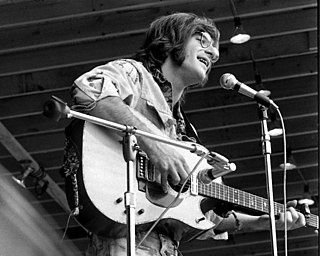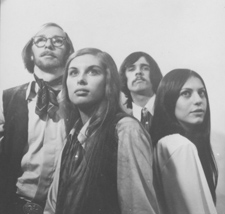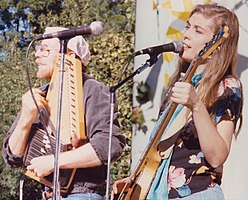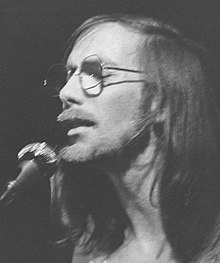
John Benson Sebastian is an American singer-songwriter, guitarist and harmonicist who founded the rock band The Lovin' Spoonful. He made an impromptu appearance at the Woodstock festival in 1969 and scored a U.S. No. 1 hit in 1976 with "Welcome Back."

Ogdens' Nut Gone Flake is the third studio album, and only concept album by the English rock band Small Faces. Released on 24 May 1968, the LP peaked at number one on the UK Album Charts on 29 June, where it remained for a total of six weeks. It ultimately became the group's final studio album during their original incarnation. The album title and distinctive packaging design was a parody of Ogden's Nut-brown Flake, a brand of tinned loose tobacco that was produced in Liverpool from 1899 onwards by Thomas Ogden.

Twice Upon a Rhyme is an LP record by Paul Levinson with Ed Fox and Peter Rosenthal. It was released in 1972 by HappySad Records on vinyl.

Beau, born Christopher John Trevor Midgley, is a British singer-songwriter and twelve-string guitar player, who first became known in the late 1960s through his recordings for John Peel's Dandelion Records label. He released two albums on Dandelion – Beau (1969) and Creation (1971), plus the single "1917 Revolution" which had greater success abroad than it did in the United Kingdom. "1917 Revolution" is said to have been the inspiration for America's "A Horse with No Name".

The Head Shop is an American psychedelic rock band from New York that released one eponymous album on Epic in 1969. The album cover features a swirling group of multi-colored boxes that surround a black-and-white image of a shrunken head. The back cover is mostly black with minimal copy but also includes a shot of the band lit from beneath.
LSD March is a Japanese psychedelic rock group, hailing from the city of Himeji, led by singer and guitarist Shinsuke Michishita. The group is named after a track by krautrock group Guru Guru. Michishita has also played with Magura Mozart and Doodles.
Nuggets is a series of compilation albums, started by Elektra Records in 1972 and continued by Rhino Records thereafter. The series focuses primarily on relatively obscure garage and psychedelic rock songs from the 1960s, but with some hits and pop-oriented songs also included.

Euphoria was a short-lived band from 1968 to 1969, consisting of Roger Penney on electric autoharp, Wendy Penney on Bass guitar, Tom Pacheco on Acoustic Guitar, and Sharon Alexander. Roger and Wendy were a folk duo performing in Greenwich Village, using the names Roger Becket and Wendy Becket. Euphoria is generally regarded as a sunshine pop group.

One Nation Underground is the debut album by American psychedelic folk group Pearls Before Swine. It was released on the ESP-Disk label in July 1967.

Roger D. Penney is a singer, songwriter and multi-instrumentalist. He pioneered a style of American psychedelic folk music in the late 60s, early 70s and is known for his inventive performances and recordings as Bermuda Triangle Band as well as Roger and Wendy and Euphoria
Wendy and Bonnie Flower were American singing sisters, who recorded the album Genesis in 1969 for Skye Records. The album was produced and arranged by jazz polymath Gary McFarland. McFarland at the time was a partner in the ownership of Skye, along with music impresario Norman Schwartz, Latin percussionist Cal Tjader, and guitarist Gábor Szabó.
Dead Man is a psychedelic rock band from Örebro, Närke, Sweden formed in 2003. The band’s sound is highly influenced by 1960s and 1970s psychedelic rock/folk rock as well as other musical genres.

Triangle is the fourth studio album by American rock band The Beau Brummels. Produced by Lenny Waronker and released in July 1967, it was the band's first album to include songs that vocalist Sal Valentino and guitarist Ron Elliott composed together. The band incorporated fantasy elements and surreal characters into the album's song titles and lyrics, and worked with a variety of session musicians to create Triangle's psychedelic musical style. The Beau Brummels were reduced to a trio—Valentino, Elliott, and Ron Meagher—at the time Triangle was recorded, as former group members Don Irving (guitars) and John Petersen (drums) left the band following the release of the group's previous album, Beau Brummels '66.

Wendy Penney is a singer and bass guitar player who began performing in 1966, and together with husband Roger Penney formed the musical groups Bermuda Triangle Band, Roger and Wendy, and Euphoria.

Michael Yonkers is an American rock musician from Minneapolis, Minnesota, United States. His work has been praised for its groundbreaking and highly experimental nature; Cole Alexander of psychedelic-rock band Black Lips said that Yonkers “kind of invented noise and drone guitar techniques," stating further that "when you think of how The Who, Jimi Hendrix and The Velvet Underground were pushing feedback at the time, he was more extreme than all three combined in terms of what he was doing.” However, his work did not reach a wide audience until decades after he began recording, due in part to a debilitating spinal injury that kept him in constant, lifelong pain.

The Story is an English psychedelic folk duo comprising the former Forest member Martin Welham and his son Tom Welham. They write and record melodic songs that range from psychedelic pop to stream-of-consciousness folk and play an array of predominantly acoustic instruments as a backdrop to their blend of vocal harmonies.

Alison O'Donnell is an Irish musician, solo and band singer-songwriter. Born Alison Bools in Dublin to an English mother and Irish father, raised in Dalkey and educated at Holy Child Killiney.
Mandrake Memorial was an American psych/progressive rock band active between 1967 and 1970, known for their Baroque sound and unique songwriting.

Helena Espvall is a Swedish-American musician noted for her participation in the post-millennial psychedelic folk and free improv scenes. Her primary instruments are cello, guitar and voice.
The Sonic Dawn is a psychedelic rock band, based in Copenhagen, Denmark. They are known as a prolific live act, having toured the European continent numerous times, and have released four full-length albums internationally. The Sonic Dawn describe their sound as "a psychedelic mixture of styles, from jazzy sitar pop to heavy acid rock." They have recently appeared alongside artists such as Graveyard and Brant Bjork.


















